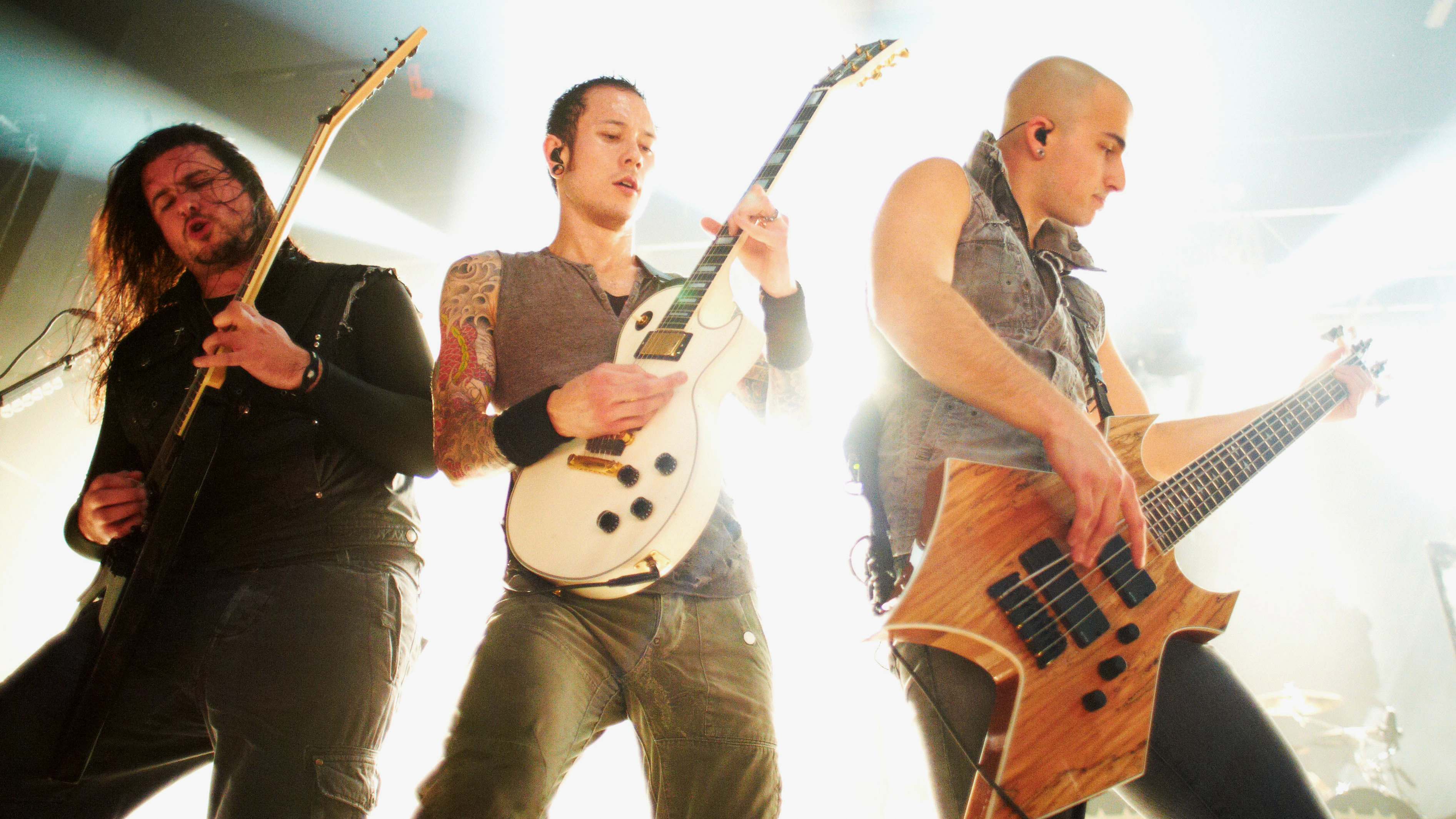This article originally appeared in Metal Hammer #221.
Heavy metal can be an unforgiving discipline. Few are the bands who survive the changing tides and even fewer are those who achieve legendary status along the way. For Florida’s Trivium, the last decade has been more than a little eventful, with enough peaks, troughs, challenges and changes to rival the history of many a vintage, veteran band.
Thrust into the spotlight when their second album, Ascendancy, became a huge surprise hit in 2005, resulting in their rapid ascent from absolutely nowhere to a lofty position as one of the UK’s very favourite US metal bands, singer and guitarist Matt Heafy, guitarist Corey Beaulieu, bassist Paolo Gregoletto and, until very recently, founder member and drummer Travis Smith have grown up in public, experiencing a combination of effusive acclaim, constantly simmering cynicism and all the pressures that such polarised reactions inevitably bring.
In fact, considering how popular Trivium remain, particularly in the UK where the band have enjoyed their greatest triumphs, it seems somewhat strange that the most common perception is that they have underachieved since Ascendancy. That album’s follow-up, The Crusade, was a well-intentioned but undeniably patchy and schizophrenic effort that received a mixed response upon its release. 2008’s Shogun, which for many people marked a new high point in Trivium’s artistic lives, again failed to emulate the across-the-board thumbs-up provoked by the band’s celebrated second outing. Throughout it all, Trivium have continued to tour with a vigour and dedication that shames most of their peers, and having trod the boards as frequent headliners and as support to the likes of Iron Maiden and Slayer, no one can seriously accuse the band of failing to pay their dues.
Nonetheless, as they prepare to unleash their fifth album, In Waves, it is clear that the Trivium of 2011 are a markedly different band from the one that has appeared to tread water over the last few years. Speaking with Metal Hammer on a hot and sunny summer afternoon in North London, all four members (including new drummer Nick Augusto, of whom more later…) exude confidence, determination and a very evident enthusiasm for their new record, and more significantly, this new chapter in their plastered across his face, “This is a rebirth for Trivium. People are either gonna love what we do or people won’t love it at all. As long as we love it, that’s all that matters, and we really love this record.”
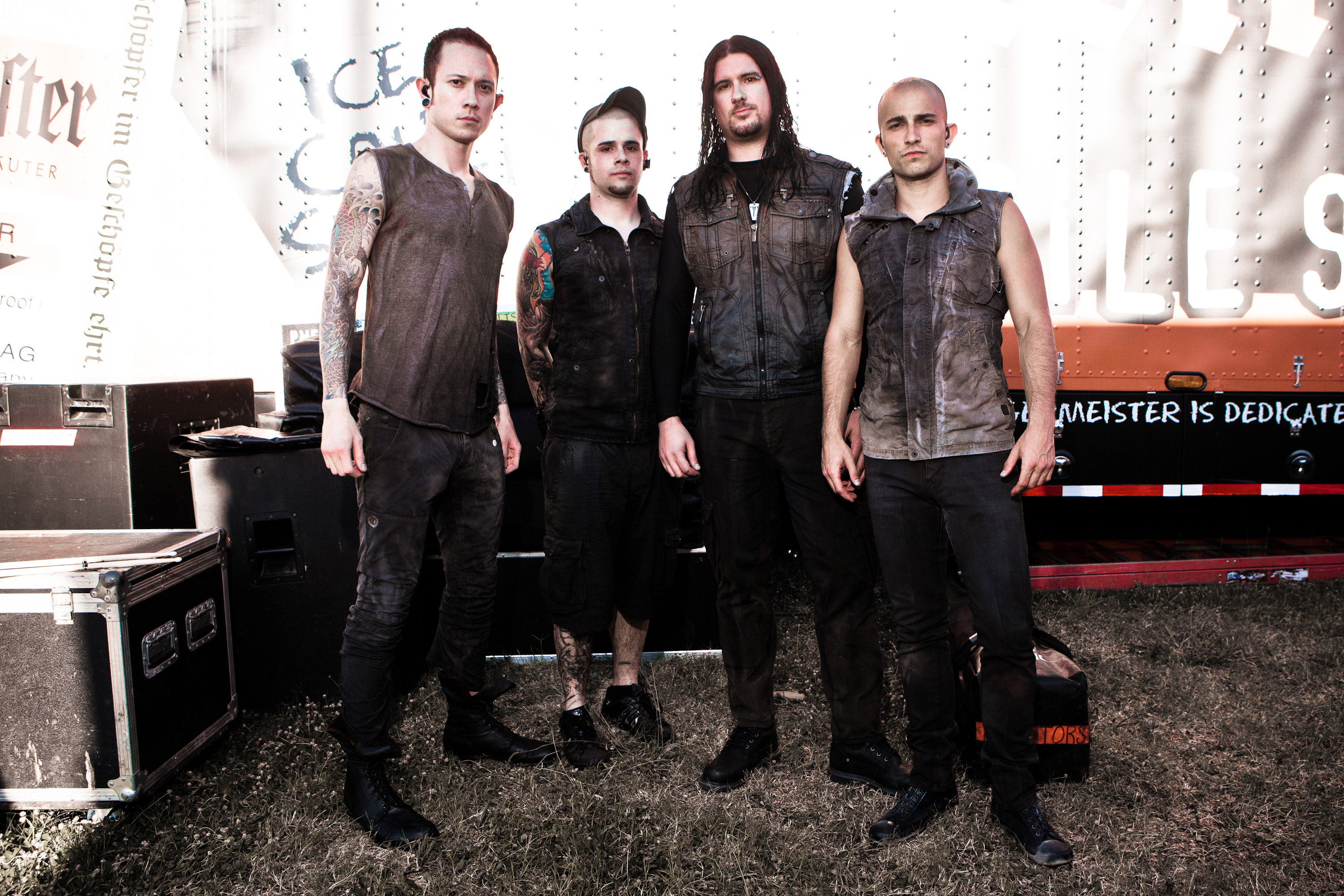
First things first, of course. Over a year has passed since Trivium announced the departure of drummer Travis Smith, prompting many fans to speculate whether the band were about to disintegrate. In truth, the addition of Nick Augusto, formerly drummer with Florida grindcore maniacs Maruta and a session musician with a burgeoning reputation, seems to have contributed greatly to the band’s wholesale rejuvenation. While they are happy to acknowledge Nick’s role, both Corey and Matt are eager to point out that Trivium’s transition from troubled to triumphant has been ongoing for some time.
“Even before the Travis thing, we had problems and there was just a lot of shit going on,” says Corey. “Not just in the band but around the band and in the crew too. A lot of people were just not representing the band in a good way and they were doing stuff, shady shit, and we were thinking ‘What the fuck is going on?’ We just put our foot down and decided to take control of this shit and just clean up our house. We wiped out half of our crew. Anyone that was not working towards what we wanted and the vision of the band, it was like, ‘You’re either with us or you’re out.’”
“We’d had tour managers who’d be terrible to bands that we’d bring out on tour,” sighs Matt. “One of our tour managers said to Seamless ‘No one eats until Matt Heafy eats.’ I don’t know why anyone would ever say that, but when it happens, bands talk! I would never tell a tour manager to say that to one of my favourite bands. So it was shit like that, basically.”
And so, as the guitarists explain, the necessary process of excising the cancer at the heart of Trivium and the organisation surrounding them began, leading to a steady but purposeful rebuilding process that has transformed every aspect of the band and their collective worldview.
“It was when we were doing Shogun that we decided that we weren’t gonna be passive about stuff anymore,” says Corey. “If someone feels that something isn’t right then we’re just gonna fix it and make sure we’re moving the way we wanted, and that just carried over into a lot of other things we were doing. We focused ourselves on having more control. With Travis, it was a lot of different issues over time that just kept building up. There was a little fracture there and he was a little more separate from everyone else, and eventually it just came to a head. The breaking point was the live shows. He was struggling to perform our material. It was sounding really bad and no one was having fun on tour.”
“Even before that, around the time of The Crusade, we nearly broke up as a band,” admits Matt. “We were so dysfunctional, so we knew that there’s always been that problem there. But we’re not saying it’s just down to Travis. It’s about the chemistry between the four of us. If we’d kept things the way they’d been, we wouldn’t be here now because we would never have accomplished anything. It was about the relationship between the four of us combined, and dealing with that was tricky. Travis didn’t pull us aside and say that he wanted to leave. I think he just waited until we said it first, and so that’s how that ended. It’s a real shame because it hasn’t been pretty at all, but I think by now he realises that it’s the best thing for him and he’s a happier and better person outside of the band, and the three of us will go on to do bigger and better things now.”
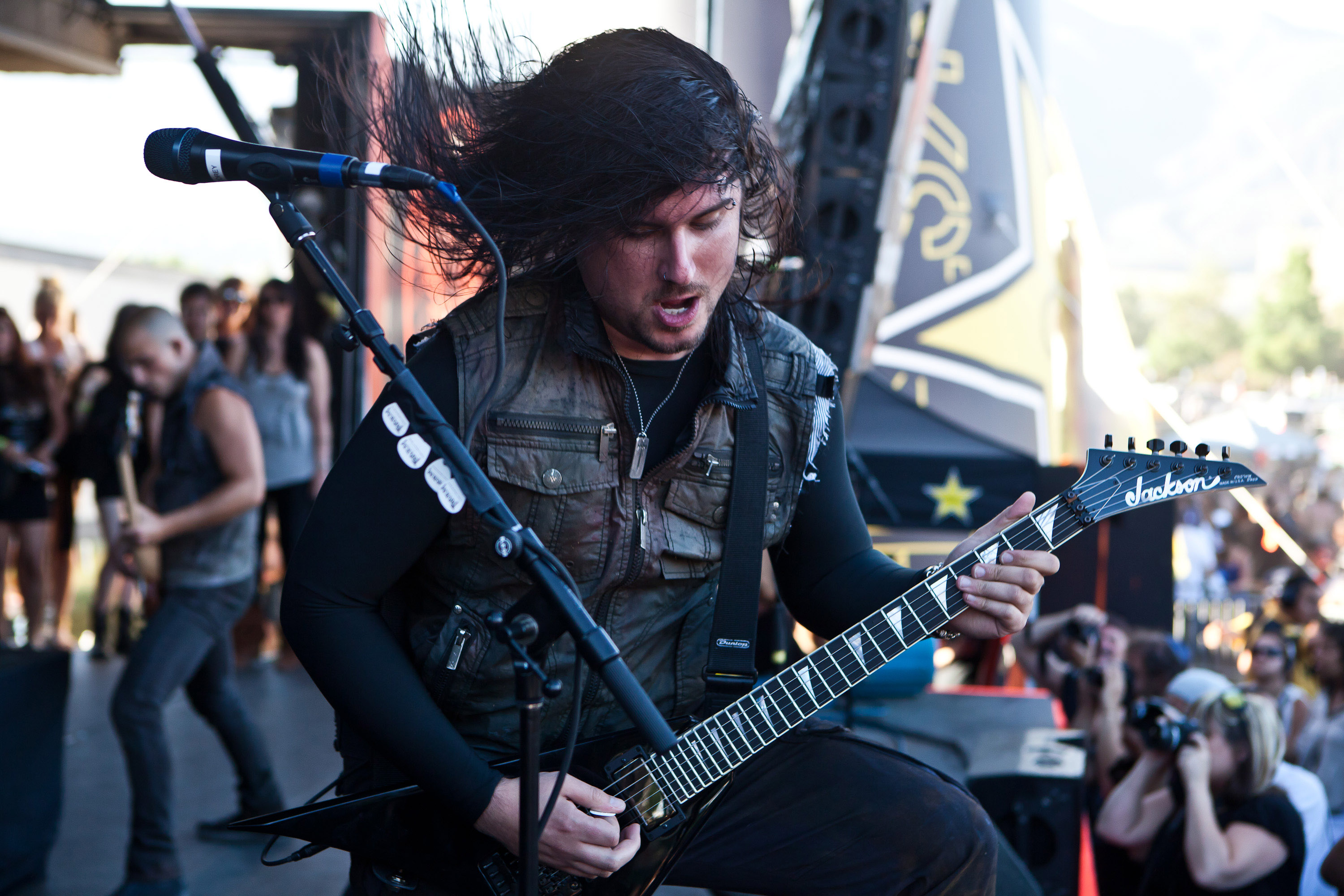
It’s not hard to see how Trivium became bogged down in the complexities of their own career. Achieving such huge success at such a young age – don’t forget that Matt was only 17 when the band’s Ember To Inferno debut was released in 2003 – ensured that several years went by at ferocious speed, with very little time between tours and studio sessions to reflect or take stock of what was really going on.
“There was no time to enjoy it either!” smiles Matt. “A lot of bands, when they come out with their first record, they’re already in their mid-20s. They’ve already tried the different looks and tried different stuff out and they can come in with everything nailed. But for us, we didn’t know what we were doing. We just made music that we liked to make and didn’t worry about anything else. We didn’t think of videos or about our stage performance. We didn’t think about how we were gonna look or about tying all these things in together, and we didn’t think like that until this record.”
Do you think you were all too worried about trying to repeat the success of Ascendancy, rather than making decisions based on what was actually best for yourselves, personally and creatively?
“Well, there was no way we were ever gonna top the buzz of Ascendancy,” says the frontman. “It was always gonna be hard. It was tricky with The Crusade for me, because I went into a bad space where I was listening for negativity on Ascendancy. The people who didn’t like Ascendancy, I wanted them to like us too! So we did the opposite. Everything that was on Ascendancy, I didn’t want it on The Crusade, so no vocal harmonies, nothing in drop-D tuning, everything in standard tuning. There are a lot of songs I like on that record, but it was just such a dark time during the making of that album. We were so frigging busy.”
“Ascendancy got so much acclaim and everybody loved it so much that if we’d made a record that was the same or had a similar vibe, people would’ve complained that it was just like Ascendancy!” grins Corey. “We were fucked either way we went. Either you do something completely different and people are like ‘What the fuck?’ or you do the same thing and people say ‘This band didn’t grow.’”
“The one thing I’ve learned is that we’ve just got to make sure we’re making what we want to make, and then if we’re going to listen to any kind of commentary about it, just listen to positive stuff,” says Matt. “My grandpa used to say ‘A third of the world’s gonna love you, a third of the world’s gonna hate you and the other third won’t give a shit.’ I think it’s about those thirds. There’s extreme love, extreme hate and then I guess you don’t see the ambivalence because those people aren’t commenting. But just this week alone we’ve had an extra 20,000 new Facebook ‘likes’. We need to focus on that and let the other stuff go.”
Revitalised and newly motivated, Matt and his bandmates have clearly undergone some form of collective awakening in recent times, finally managing to pause for breath and re-evaluate the very notion of what it means to be a full-time, professional heavy metal band with responsibilities, ambitions and a substantial and demanding fanbase. With hindsight, the seeds for this newfound maturity seem to have been sown as far back as 2006, when Trivium toured with Metallica, Machine Head and, most memorably, Iron Maiden on their A Matter Of Life And Death tour. Spend time with such heavyweight bands that have been through every conceivable high and low in their careers and emerged victorious, and you will inevitably learn some important lessons.
- Matt Heafy's Albums Of 2014
- Trivium's Silence In The Snow Track By Track: Part One
- Trivium: "Anger a samurai, they can chop your head off. That's metal!"
- The 10 best Iron Maiden songs that I've produced, by Kevin Shirley
“Being out with bands that are professional and know what they’re doing teaches you a lot,” states Corey. “Like Maiden, they just do their own thing. We toured with them when they played A Matter Of Life And Death from front to back. When you have such a vast and popular back catalogue, to go out and play a brand new album, that’s a pretty ballsy move and it still worked. Ever since Bruce came back they’ve done whatever they feel like doing and whatever they felt was right for them. For us, looking back at our other records and the videos and stuff, we were just doing whatever we thought was right for the industry because that’s what bands do, but now, instead of doing what everyone else is doing, we don’t give a shit what everyone else thinks. We just took control of all the aspects of the record and did what we wanted with no outside interference. In Waves is our record.”
A fiery and defiant response to anyone who thought that Trivium had exhausted their supply of inspiration too early in their career, In Waves reveals several important truths about this band. The first, and most important, is that they have finally come of age and constructed a potent and extremely well-defined identity of their own. Where both The Crusade and Shogun sounded like spirited but indecisive attempts to cover as much musical ground as possible, In Waves is all about sharp focus and the narrowed eyes of dedicated artists homing in on very specific creative targets.
The second thing that we learn from In Waves is that a more relaxed and optimistic outlook has done wonders for Trivium’s ability to write catchy songs. Past records may have contained plenty of great moments, flashes of grand ambition and vast amounts of technical dexterity, but none of those things are any substitute for the succinctness and stripped-down immediacy of these new songs. Electing to keep things simple, albeit still with plenty of room to show off those finely honed chops, is the smartest move this band ever made.
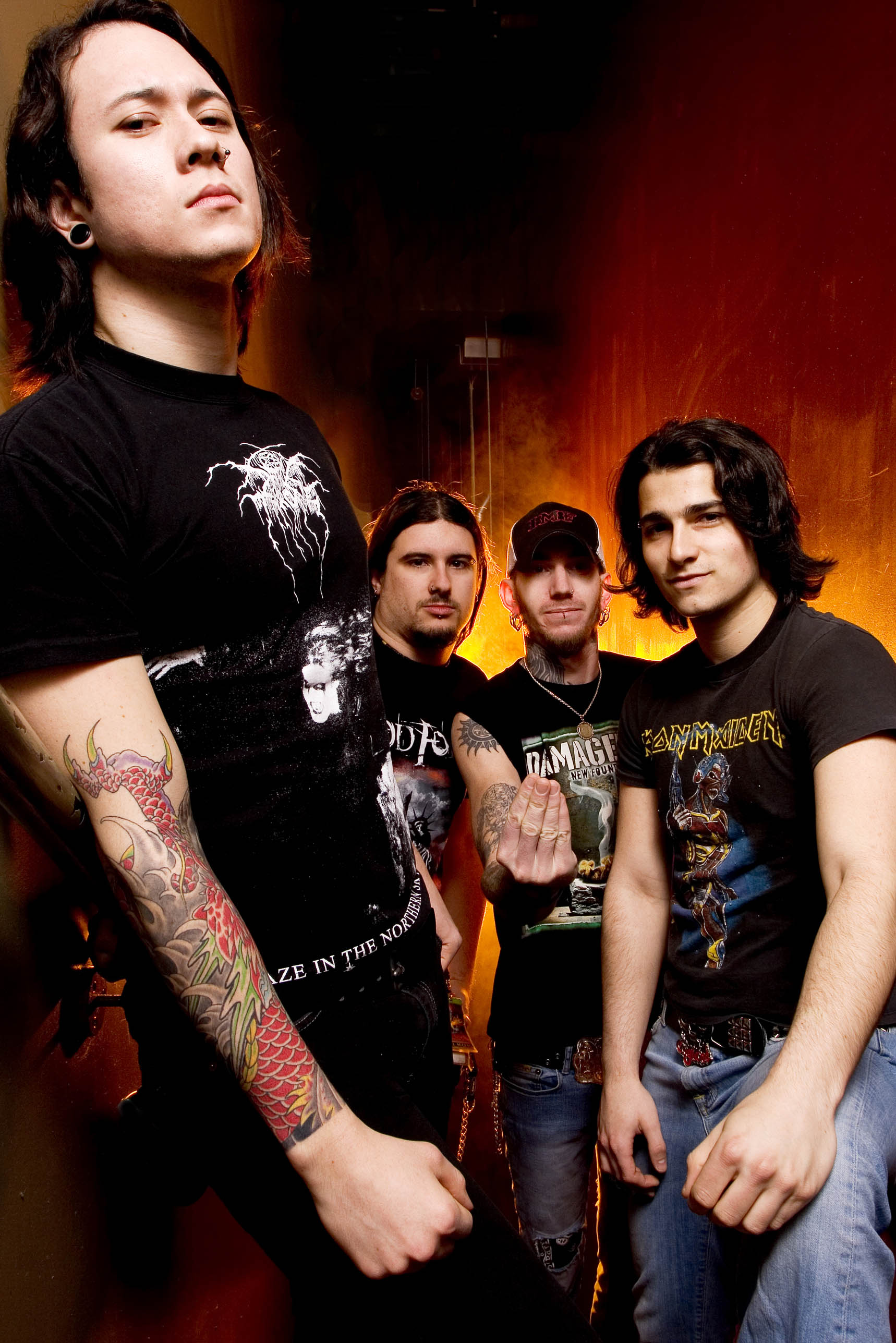
Finally, unless you are utterly incapable of shelving your cynicism, In Waves provides ample proof that Trivium are anything but the giddy opportunists that their sudden rise to glory implied. While certain members of their peer group have prioritised commercial clout and the cheerful exploitation of a very young and naïve audience, Trivium are simply getting on with the business of making great metal records. It’s not hard to imagine Bullet For My Valentine fans embracing In Waves, but neither is it hard to imagine more world-weary metalheads surrendering to its hard-edged but strongly melodic charms.
“It’s kinda become a staple of what we do, that with each record you don’t really know what it’s gonna be,” nods Corey. “I just think it’s the natural way we write. There’s always some new influence that triggers the music. But before we even started writing for this record or putting the songs together, we decided that this record really needs to define who we are and make a statement, like ‘This is Trivium!’, and then really nail home that fact instead of trying to fuck around with too much off-the-path weird shit. It was like, ‘Let’s write some kickass heavy metal songs!’ No bullshit. Straight to the point. It’s the catchiest thing we’ve ever done and it really nails down our sound.”
Although it’s extremely hard to be entirely objective about music, the one thing that stands out most powerfully about In Waves is that it’s arguably the first album Trivium have made that contains nothing that could have been written or played by anyone else. Put simply, it sounds like Trivium being Trivium, as opposed to hedging their bets by breathlessly covering as much musical ground as possible.
“A few people have said that to us now, that when they hear this record, all they think is ‘This is Trivium’,” says Corey. “I think that was a motivation and an inspirational factor, to put the foot on the gas and really hammer that point home and solidify a strong identity, so that anyone who’s ever heard us will recognise us right away from the way it sounds.”
“It’s crazy because on top of having this big challenge of making a definitive record, we’ve brought in a new drummer and we’ve got to make sure that our styles are all connected,” says bassist Paolo Gregoletto. “We had to solve how we were gonna make a really killer record and bring a new member in and make it sound like Trivium. It was a balancing act. But it really came down to writing a lot of stuff, actually jamming it and being mature enough to say to each other ‘That riff wasn’t good enough’ and then getting over it and not being babies about it.”
Given that he is still the new boy, Nick Augusto is understandably the least talkative of the four musicians present during our interview, but his presence – both on In Waves and in person – is substantial and highly significant. A ridiculously gifted drummer, he has previously displayed his skills on a handful of noted underground extreme metal releases, but In Waves signifies his debut as a member of a big, mainstream metal band, and it doesn’t take long to infer that his performance on this album is nothing short of astonishing. That said, he still wears the unmistakably bemused grin of a young man who has just had his life turned upside down.
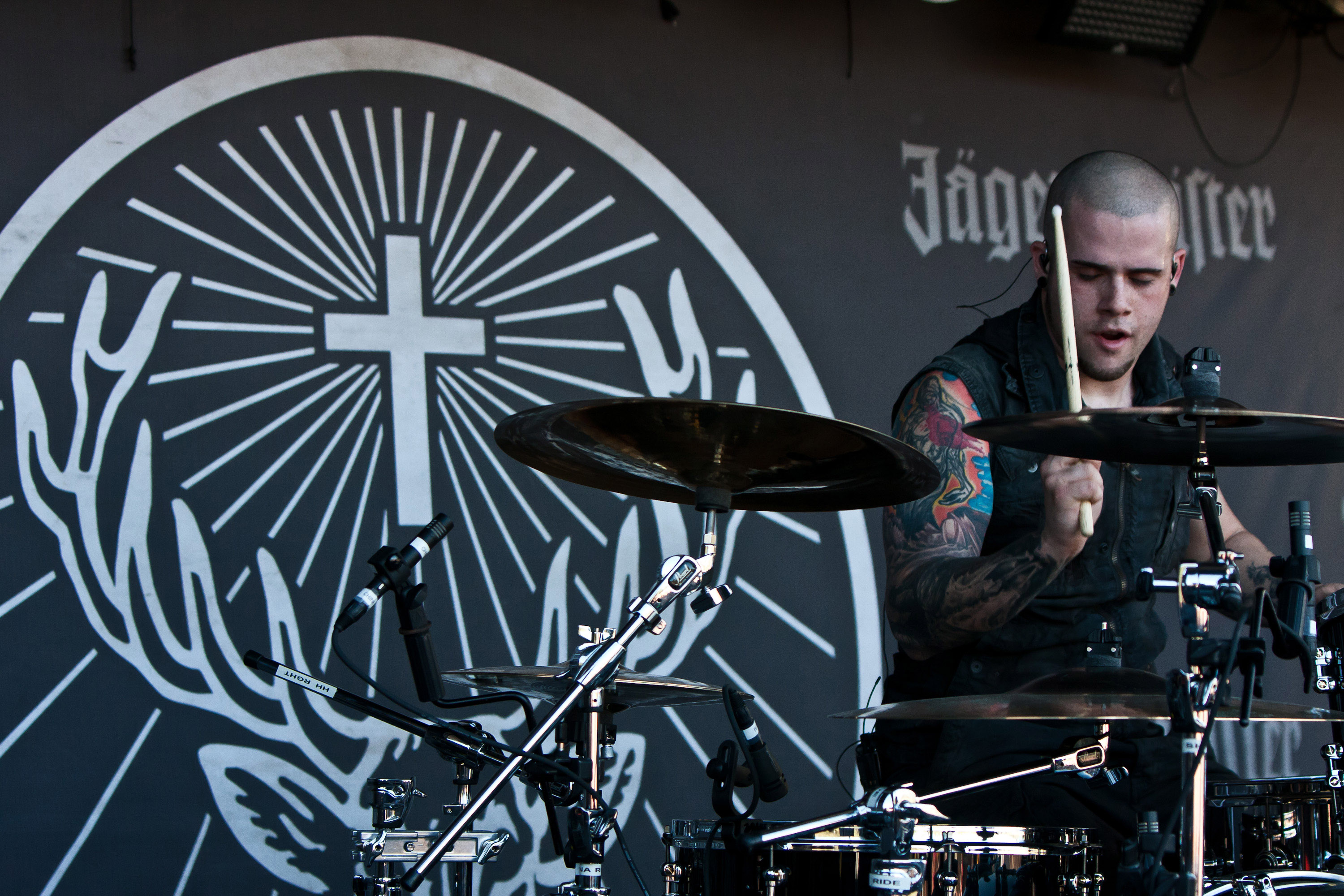
“Nick’s relationship with Trivium began when Travis said he was going to sit out a tour in 2009,” recalls Corey. “We were doing a five-week tour and we had a two-week break and then we had another six-week tour booked, all in the US, and it was supposed to be our big Shogun headlining tour. It was almost 80 shows, our only headline tour of the US and it was full-on! There were two weeks left of the tour and Travis was like ‘I’m not gonna do the rest of the tour…’ Well, we’re not the kind of band that cancels tours. If we book a show, we’re there, so calling it off was never a consideration. Paolo must’ve seen it coming because he said ‘Yeah, I already gave the setlist to Nick.’ He was the drum tech on the Mayhem tour we did five months before…”
“But we fired him on day three!” laughs Matt. “Let’s just say he’s a better drummer than a drum tech! Ha ha!”
“I’ve known Paolo since grade school and kindergarten,” Nick explains. “We picked up our instruments about the same time, around 11 or 12, and we formed our first band together because we’re at the same level playing-wise. We went our separate ways into different bands and all that, but we’d still always hang out when he was off tour and came back home. One day he called me up and said ‘What are you doing?’ and I said ‘Why? What’s up?’ and then he asked me to tech. So I quit my job and flew out the next day and did the whole tour.
“It was basically the same call he got to get him into the band,” says Paolo. “I said, ‘Hey dude, I just wanna know if you’re able to learn a full headlining set in the next 12 days! Are you ready to jam next week and then come on a full headlining tour?’ He said ‘Yup!’ quit another job and that was it.”
No one in Trivium is going to deny that losing Travis Smith was a major wrench to them, both emotionally and musically, not least because he had been behind the kit throughout the band’s entire story so far and had shared all those life-changing experiences, and so Nick’s ability to fit in and deliver what was both needed and expected was of paramount importance. Happily, it turns out that he is the final piece of the puzzle that had been missing all along.
“We knew Nick was cool and we knew we got along with him great, but we’d never seen him play drums before,” says Corey. “We asked Paolo, ‘But can he play?’ and Paolo said ‘Trust me! He’ll be good. We’ve got to have Nick…’ So he was learning the set while we were still on tour, and then he came up to Orlando and we rehearsed with him and it was an eye-opener. We started playing with him and seeing his skills and hearing some of the old songs from Ascendancy, which were really fast with a lot of double bass, and he was just blasting through it and we were like, ‘Oh my God!’ We couldn’t believe it.”

“I didn’t think it was real!” adds Matt. “I’d never heard our songs sound as good as they did on the record ever.”
“Once we started touring, the energy in the crowds was stronger, our live performance was tighter, the shows were more fun,” Corey continues. “The whole vibe of the tour was more fun and just having that time and seeing what could be like, it just made it easier to make the decision to fire Travis. At any other time in our career we wouldn’t have known what to do and it would’ve left a bunch of question marks, but having Nick there, and him just killing it like that, it opened our eyes. If we have a drummer like this, the possibilities are endless! So we made the call. It seems like ever since he came into the band, making this record and writing these songs, everything’s fallen into place so easily.”
“Right before Nick was in the band it was getting to that point where I was saying to myself, ‘Am I really happy doing this?’” Paolo recalls, shaking his head as he remembers darker days. “We’d had this huge momentum coming out of the gate and then we were thinking ‘Where did the love for playing in a heavy band go?’ and things like that. When we got Nick in, it was like that again but we all meshed together so well and wanted to hang out more and write more stuff together. Before that happened, there was never that tight of a bond. That bond and that friendship feeds back into the music and it makes everything a lot easier.”
Nick has played in grindcore and death metal bands in the past, but presumably playing in Trivium, where melody and big hooks are more important than outright brutality, is an entirely different discipline?
“Yeah, you have to be a lot more solid but play fast at the same time,” nods the drummer. “It’s not just blasting. It definitely made me better, for sure. I came up with a lot of new ideas from just playing with those guys. It made me want to step it up too, because now I’m in this pro band and I’ve got to make a name for myself. I’m still doing it and trying to improve. Doing the album really helped because you can hear everything you do, raw on tape, and that kicked my ass a little bit to be clean and just play tight. We wrote this record together and it definitely sealed the deal and made me feel part of the band. It wasn’t like I just showed up and played. It feels like a whole new thing now.”
If In Waves represents anything, it is that simplicity is often the key to great metal records. Songs like the thunderous title track – with its juddering lead riff that simultaneously recalls both the poly-rhythmic thump of Meshuggah and a particularly infectious metalcore breakdown – and the insanely catchy Watch The World Burn, offer a refined upgrade of Trivium’s finest past moments, with all the naïve experimentation and indulgent showboating stripped away to reveal a gleaming, streamlined core of bullshit-free heavy fucking metal.
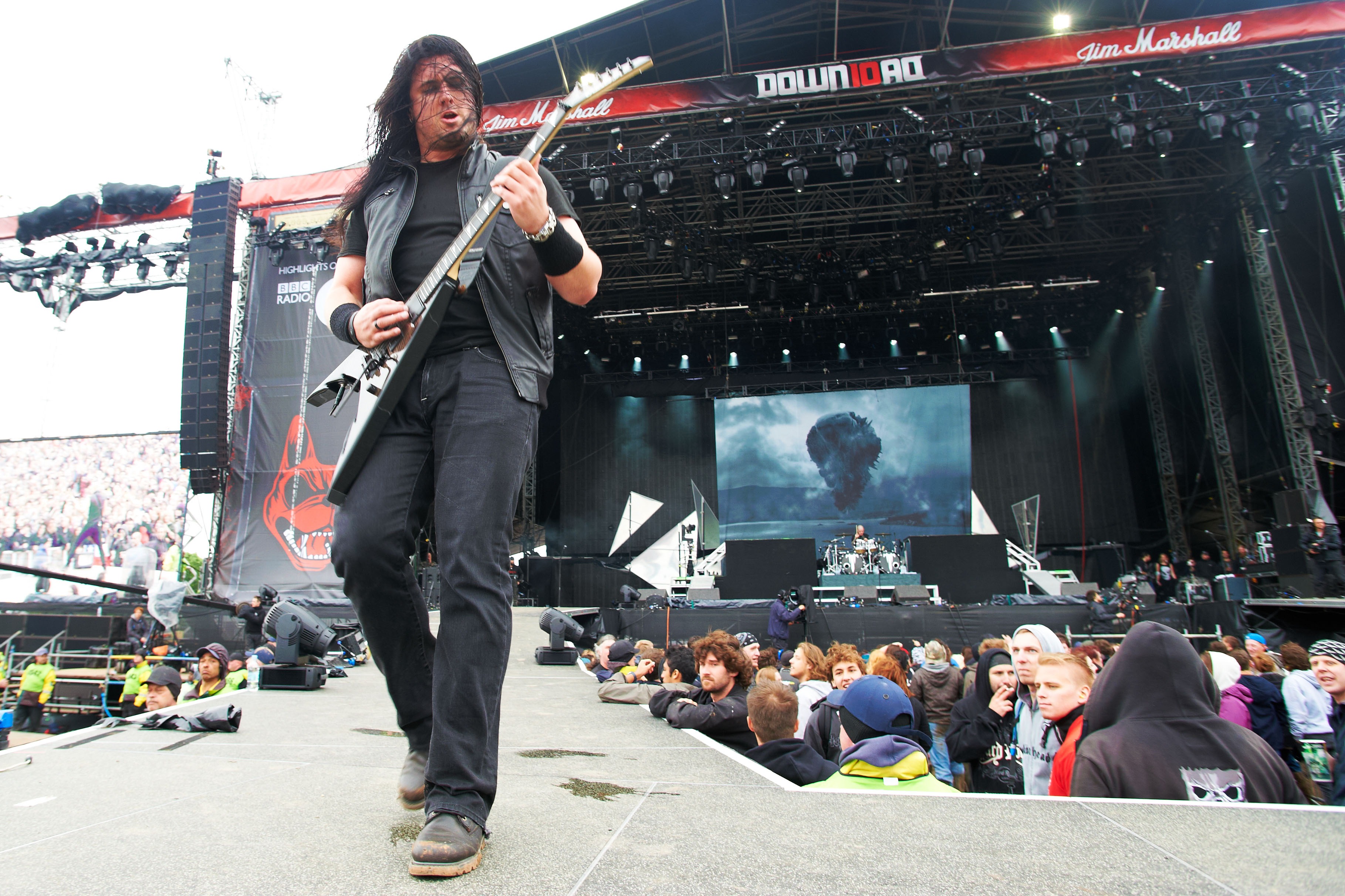
“We’re seeing loads of bands now with killer guitar players who are really technical and proggy, especially in some of the deathcore bands in the US, but when you walk away from their show for the first time, what do you remember?” asks Matt. “You don’t really remember a riff, a hook or a song. This record is our response to what I’ve begun to see as ‘the same old thing’, and recently metal has become the same old thing. There’s not been anything lately that’s breaking the tradition, it’s just been the same music videos and the same formula.”
From the songs themselves to the mysterious artwork and proudly unconventional visual elements for the album’s accompanying DVD that the band have spent the last year piecing together, In Waves is what happens when a great band take control of their affairs, remembering what made them special in the first place and celebrating that with unprecedented passion and verve. Trivium may never reproduce that first, invigorating rush of success, but they are now fully equipped to march into the future, emboldened by each other and inspired by the knowledge that they looked disaster in the face and laughed.
“This ain’t fucking around,” deadpans Corey. “There’s something we’ve captured on this record, this unexplainable fire and energy in the performances that the other records didn’t have. This record gets you jacked up. Our manager was like, ‘Man, every time I listen to the record I wanna go and punch somebody!’ It’s one of those metal records, like when I was a kid and I heard Slayer for the first time. I went ‘Fuck yeah!’ and it sparked something in me.”
“We feel so prepared now,” concludes Matt. “I look at the bands that got me into metal and I see that their songwriting is dwindling, their art is looking cornier, and it makes me angry to see that in the US, metal isn’t cool anymore. I want to change the game. That’s the goal now. Regardless of any positive, negative or mediocre response, we’re gonna do exactly what we want to do and have a good time doing it.”
For more on Trivium and how they brokered their legend, then click on the link below.
